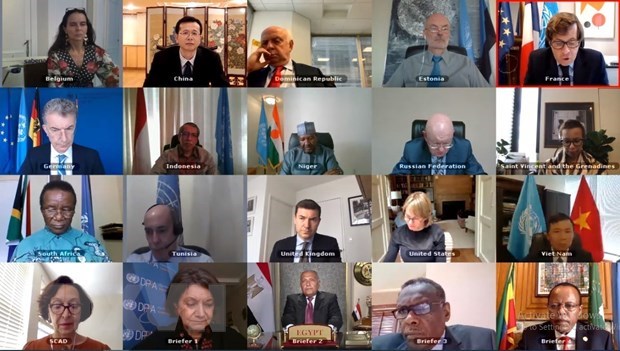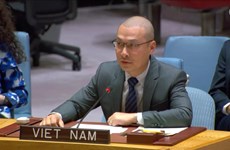UN Security Council discusses Grand Ethiopian Renaissance Dam
The UN Security Council (UNSC) held an online discussion on June 29 regarding the Grand Ethiopian Renaissance Dam (GERD).
 Online session of the UNSC on Grand Ethiopian Renaissance Dam (GERD) (Source: VNA)
Online session of the UNSC on Grand Ethiopian Renaissance Dam (GERD) (Source: VNA)Hanoi (VNA) - The UN Security Council (UNSC) held an online discussion on June 29 regarding the Grand Ethiopian Renaissance Dam (GERD).
GERD is a hydroelectric project launched in 2011 on the Blue Nile in Ethiopia.
Ethiopia and two downstream countries, Sudan and Egypt, have been working to discuss technical and legal issues relating to the project since 2012 but are yet to come to an agreement.
In March 2015, the three countries agreed to adopt the Declaration of Principles for GERD construction (DoPs 2015).
Addressing the June 29 discussion, Ambassador Dang Dinh Quy, head of the Vietnamese mission to the UN, expressed his concern over many international river flows being exploited unsustainably and failing to ensure the legitimate interests of affected countries.
He voiced his support for negotiations and cooperative efforts by the parties directly involved in the exploitation and use of the Nile River, and called upon countries to continue efforts and promote results, especially in the implementation of DoPs 2015.
The official also advocated solutions for resolving problems through peaceful measures, in the spirit of friendship and goodwill.
He spoke highly of the African Union’s role in pushing negotiations between the three countries, emphasising the need to promote trans-boundary water practices, including consultation and information sharing.
Sharing the use of international water resources should be in line with international law and the commitments of involved countries on the basis of harmonising the interests of coastal nations, especially those downstream, and ensuring sustainable development for the whole region, Ambassador Quy said.
He asked involved parties to cease any action that intensifies tensions, while emphasising the importance of promoting the codification and formulation of international laws, regulations, and practices relating to water security, such as implementing the UN Convention on the Law of the Non-Navigational Uses of International Watercourses./.












